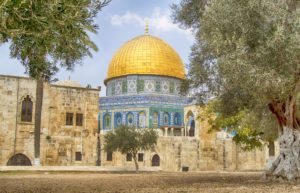The time came of course when the Muslims were blessed with great wealth and material goodness of every description. Abu Hurayrah (R.A.) eventually got his share of wealth. He had a comfortable home, a wife and child. But this turn of fortune did not change his personality. Neither did he forget his days of destitution. He would “I grew up as an orphan and I emigrated as a poor and indigent person. I used to take food for my stomach from Busrah bint Ghazwan. I served people when they returned from journeys and led their camels when they set out. Then Allah caused me to marry her (Busrah). So praise be to Allah who has strengthened his religion and made Abu Hurayrah an imam.” (This last statement is a reference to the time when he became governor of Madinah.)
Much of Abu Hurayrah’s (R.A.) time would be spent in spiritual exercises and devotion to Allah. Qiyam al-Layl (staying up for the night in prayer and devotion) was a regular practice of his family including his wife and his daughter. He would stay up for a third of the night, his wife for another third and his daughter for a third. In this way, in the house of Abu Hurayrah (R.A.) no hour of the night would pass without ibadah, dhikr and Salat.
During the caliphate of Umar ibn Khattab (R.A.), Umar appointed him as governor of Bakrain. Umar (R.A.) was very scrupulous about the type of persons whom he appointed as governors. He was always concerned that his governors should live simply and frugally and not acquire much wealth even though this was through lawful means.
In Bahrain, Abu Hurayrah (R.A.) became quite rich. Umar (R.A) heard of this and recalled him to Madinah. Umar (R.A.) thought he had acquired his wealth through unlawful means and questioned him about where and how he had acquired such a fortune.
Abu Hurayrah (R.A.) replied: “From breeding horses and gifts which I received.”
“Hand it over to the treasury of the Muslims,” ordered Umar (R.A.).
Abu Hurayrah (R.A.) did as he was told and raised his hands to the heavens and prayed:
“O Lord, forgive the Amir al-Muminin.”
Subsequently, Umar (R.A.) asked him to become governor once again but he declined. Umar (R.A.) asked him why he refused and he said:
“So that my honor would not be besmirched, my wealth taken and my back beaten.” And he added: “And I fear to judge without knowledge and speak without wisdom.”
Throughout his life Abu Hurayrah (R.A.) remained kind and courteous to his mother. Whenever he wanted to leave home, he would stand at the door of her room and say: As-Salaam-u-Alaykum, yaa ummataah, wa rahrnatullahi wa barakatuhu (peace be on you, mother, and the mercy and blessings of Allah).” She would reply: “Waalayk-um-Asalaam, yaa bunayya, wa rahmatullahi wa barakatuhu (And on you be peace, my son, and the mercy and blessings of Allah).” Often, he would also say: “May Allah have mercy on you as you cared for me when I was small,” and she would reply: “May Allah have mercy on you as you delivered me from error when I was old.”
Abu Hurayrah (R.A.) always encouraged other people to be kind and good to their parents.
One day he saw two men walking together, one older than the other. He asked the younger one:
“What is this man to you?”
“My father,” the person replied.
“Don’t call him by his name. Don’t walk in front of him and don’t sit before him,” advised Abu Hurayrah (R.A.).
Muslims owe a debt of gratitude to Abu Hurayrah (R.A.) for helping to preserve and transmit the valuable legacy of the Prophet (S.A.W.), may Allah bless him and grant him peace. He died in the year 59 AH when he was seventy-eight years old.
(The above sections were adapted from islamicfinder.org)
